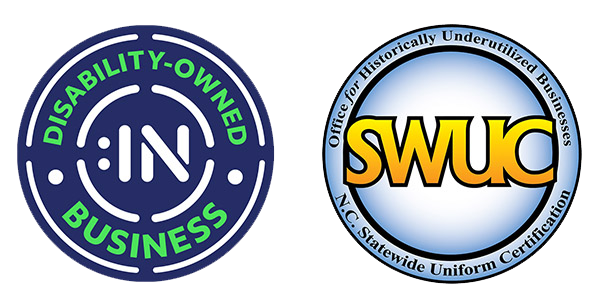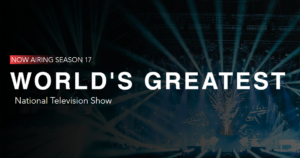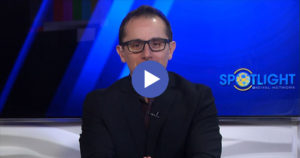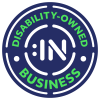Meet Brad Klein, CODA
April 25, 2023 2023-05-22 17:08Meet Brad Klein, CODA
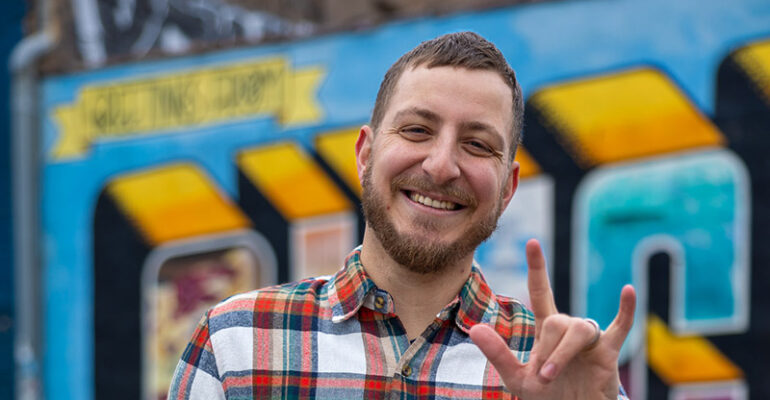
Meet Brad Klein, CODA
Safe’N’Clear is highlighting its first CODA as part of the Deaf Leader Series. Read Brad Klein’s story as a proud CODA understands first-hand the importance of inclusivity and equity…
Brad’s first memory of his parents being deaf was when he was about 3 or 4 years old. His mother took Brad and a friend to the playground after preschool. Brad vividly recalls he and his friend were playing on the wood chips and his friend fell, scraping his knee. His friend started crying and Brad saw that his mom could not see them. Brad told his friend, “My mom’s ears are broken. She can’t hear us. You have to show her your boo-boo.” His mom pulled out a Ninja turtle band-aid from her first aid kit and they resorted back to playing.
You may have read stories of how CODAs might “test” to see if their parents are truly deaf. Brad remembers getting angry and frustrated that his friends’ parents would respond to their children’s crying and yelling but when Brad would cry or y ell, his parents did not respond. Brad’s mom explained that her ears were “broken.” To a toddler at the time, Brad could understand why he, his friends, and his friend’s parents could hear and his mother could not. The difference was perhaps made easier for Brad because Brad’s mother has a blind sister. In other words, Brad grew up used to people not being exactly like him.
With two deaf parents, Brad up embedded into the Deaf community and culture. Thus, the fact that his parents are deaf was no big deal.
Back in the day, CODA’s were the phone ringers, door bell ringers, telephone translators, smoke alarms, and etc. as alerts were all broadcasted audibly. Innovation in technology and more awareness towards accommodating people who are differently abled has come a long way in 30 years. Texts, app alerts, and smartphones have been game changers for Brad’s parents, especially while traveling.
Brad has read Paul Preston’s Mother Father Deaf . Paul Preston’s stories and anecdotes from CODAs about their perspective about how growing up with deaf parents has shaped their lives is something that Brad and most other CODAs can relate… that is, CODA’s parents wanted their children to live full, happy lives and encouraged them to explore all avenues available to them in both the Deaf and Hearing worlds. Yet, while Mother Father Deaf does share Brad’s story, he has also been educated reading that some CODAs who did not have all warm and fuzzy feelings towards the Deaf community and their parents.
CODA’s are often asked for their feedback on movies, such as Children of a Lesser God (1986) or CODA (2021). Brad appreciated that a Deaf actress, Marlee Matlin, was casted in the role of Sarah. Representation and authenticity is SO important for roles. For Brad, CODA was well done and portrayed his experiences as a CODA fairly accurately. CODA deserved every award received. Brad recommends CODA to everyone he knows as the movie did an excellent job to represent not just his point of view as a CODA but also show the continued battles Deaf people face daily, such as getting left out of conversations among the moms or within a workplace water cooler talk. The movie, CODA, did not cast an actual CODA- the main character? There were had dozens of CODAs on the set as interpreters, consultants about being a CODA, etc. Representation matters to CODA’s, too.
In the movie, the main character, Ruby, does not sign while she is singing around her parents until the very end. While this may have been, by design, from a movie production perspective to build up the “Hollywood fairy tale ending,” in reality, most CODAs will immediately start signing when they are around deaf people to help make sure they are not left out. CODA’s are sensitized to equity and inclusion.
When Brad was 6 years old, his elementary school was rebuilt and reopened with a big ceremony. During one event, the whole school was singing the song, “Hand in Hand.” Brad asked if he could sign the song so his parents would not be left out of the concert; his music teacher put Brad in a front row solo spot for the song. At 6 years old, Brad knew not to leave his parents out so at 18, the character Ruby would know not to leave her parents out either.
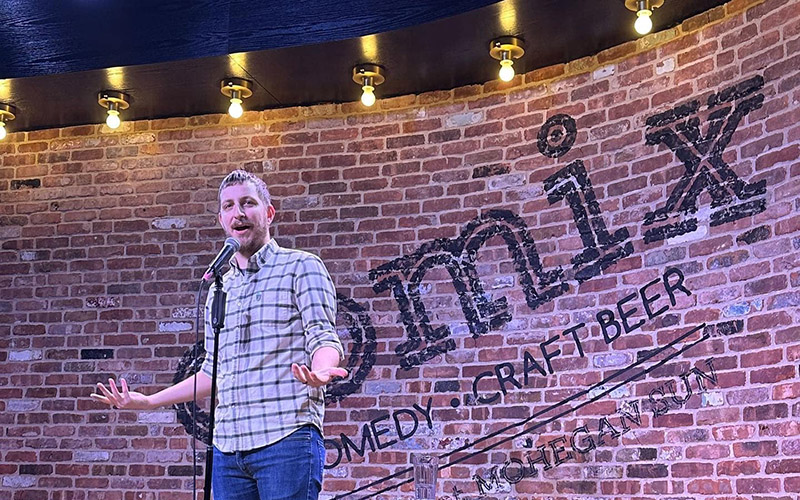
Shifting gears, I asked Brad to tell me about how his career as a comedian began. Brad was an only child which prompted him to develop a rich imagination to keep himself entertained. Rich imagination + a visual and animated sign language = Brad getting skilled at storytelling using the emotions of ASL with his creativity. Brad watched comedy movies growing up. His parents’ favorite movies and TV shows were being rebroadcasted and re-released on VHS and DVD with captioning so finally his parents were able to learn exactly what was going on with the dialogue. Brad watched a lot of the shows from his parents’ era picking up the slapstick, rubber face facial expressions, and physical comedy acting and combined with witty writing and storytelling from his generation.
Brad has been a comedian for as long as he can remember. His first recollection was a standup experience was in second grade at the school talent show where he told a mix of jokes he had read in a joke book and some he wrote. He performed comedic acting in high school clubs. During his senior year of college Brad chatted with a famous comedian. Brad shared some of jokes about growing up with Deaf parents and the comedian loved them. He encouraged me to do open mics and I did my first standup open mic shortly after meeting him. Brad has been pushing hard on comedy for the past 8 years which has given him experience doing standup, improv, and sketch comedy.
Not all of Brad’s comedy stems from being a CODA. Brad readily acknowledges that the CODA material differentiates him from other comedians but Brad still has the ability to chat about Chicago, sports, social media/digital marketing, and even cancer. The cancer comedy stems from his wife breast cancer diagnosis six months after they married and her recovery four years ago. Brad confides that CODA comedy is his favorite genre. “Being a CODA is something that makes me unique and I’m able to educate hearing audiences about the Deaf community and relate to Deaf audiences about how even though I’m hearing, I will always have a Deaf heart and call the Deaf community my home.”
Brad’s parents are incredibly supportive of his comedy career and attend as they are able. Chicago has a great Deaf community and Brad attends the meetup events when he is in town. Brad shares, ”I love when Deaf people come to my shows at clubs usually attended by hearing audience members. I do perform for Deaf audiences at events tailored towards Deaf people such as Deaf schools, Deaf conferences and have spoken at high school ASL club meetings too about my experiences growing up with Deaf parents. My comedy for a Deaf-only event is a bit different than for a hearing audience. I can go full ASL for a Deaf audience and include some jokes that only Deaf people would get (like about TTYs, GA GA SK SK).”
Brad is well-aware of other CODAs loves chatting with fellow CODAs online. As aptly put in Paul Preston’s book, Mother Father Deaf, there is a tight bond over CODA’s shared experiences and Brad always enjoys chatting about growing up with Deaf parents and about life, in general.
Perks and benefits of being a CODA, according to Brad, include (but not limited to: “I love having Deaf parents because it has allowed me to speak a beautiful language, be bilingual, and get to experience two cultures at once. The Deaf community and culture is so wonderful and I am so lucky that I not only get to be a part of it, I am often mistaken at Deaf events for a Deaf person (a compliment I hold very dear to my heart). I also grew up surrounded by people of all shapes, sizes, and abilities. It quickly taught me about empathy, equity, and equality for those who are not what the world calls “normal”, making me a more empathetic and caring person towards others. I heard a quote recently that has stuck with me – ‘We never know what battle people are facing in their lives, so if we can be anything in this world, why not be kind?’
In her interview, Dr. McIntosh asked Brad what would he like the world to know about deaf people that he sees, as a CODA, that the hearing world does not know or misunderstands? Brad responded with two thoughts; first: “Deaf does not equal dumb, disabled, or damaged. All too often in my life, I have seen people look at my parents as “less-than” or “broken” when they can do anything except hear. Second, “Deaf households are not silent; they can be the loudest places on earth sometimes AND have lights flashing everywhere! Deaf people do not always know how loud they are sometimes. I can now sleep through any noise after growing up with Deaf parents and getting used to vacuums, TVs, and dishes crashing in the sink. My alarm clock is a vibrating one meant for deaf people because I am essentially deaf when I sleep!”
Brad shared that “being a CODA is amazing and wonderful but being a CODA is not always easy.” He hits to the heart of what Padden and Humphries talk about in their book when he continued, “We grow up in both the Deaf and Hearing cultures and our identity is often split. It can be hard for us to figure out who we are as we navigate honoring both cultures we are a part of. I love being a CODA for all the reasons listed above and more, but it is not as easy as everyone thinks it is.
As much as Deaf parents do not want to depend on their hearing children to be their interpreters, ears, or vehicles into the hearing world, we often are. After speaking with some of my friends who are 1st generation from other countries/languages, they have similar experiences as we often are the bridge between the two worlds’ form of communication for our parents. It is a cultural phenomenon for all languages, not just for the Deaf community. Technology is getting better for Deaf people but CODAs will always be called upon to help in emergencies and last-minute situations.”
Brad shares some really poignant reflections that he wants the Deaf community to know about their CODA’s. “Your CODA may be hearing, but that does not mean they will turn their back on the Deaf community. I know it is hard to trust the hearing world sometimes and after seeing the discrimination and oppression firsthand, I get it but please trust your CODA. They have a Deaf heart, the Deaf community is always home to us, and while we may fly away from the nest for a while, we take with us all of the wonderful lessons and love that the Deaf community has engraved into us from the day our parents first signed ILY to us. We may not be deaf), but we will always be Deaf as in culture and community.”
References:
McIntosh, Anne. (2023). Email communications with Brad Klein.
Padden, Carol and Humphries, Tom. (1988). Deaf in America: Voices from a Culture. Cambridge, MA: Harvard University Press.
Preston, Paul. (1994). Mother Father Deaf: Living between Sound and Silence. Cambridge, MA: Harvard University Press.
Purchase Online
Featured Deaf Leader
Recent Articles
